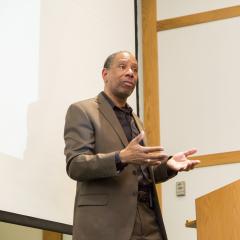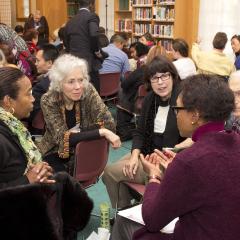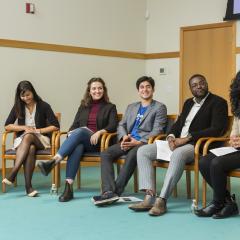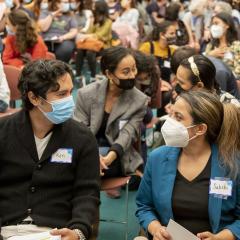Ceasar McDowell: Knowledge and Voice Build Community
Ceasar McDowell is Professor of the Practice of Community Development at M.I.T.’s Center for Constructive Communication. He also is Director of the global civic engagement organization Dropping Knowledge International. All of McDowell’s work is committed to the development of programs focused on knowledge building at the community level. McDowell was interviewed in the spring of 2005 by Patti Marxsen.
PM: In a sense, for most of us the family we grow up in is our first experience of community. What was your family like and what part of that experience remains with you?
CM: Like a lot of African-Americans in this country my family was divided between the North and the South. Most of my family lived in rural Louisiana. When my father was discharged from the service in 1944 in Colorado, he and my mother decided to stay there. I was the first person in our family to be born outside of the South. Growing up, I spent most of my summers in a small rural community in Louisiana, and all my school months in urban Denver, Colorado.
You lived in two worlds.
Yes, my childhood was split between two worlds and they were very different worlds. I was born in 1950, but it was not until 1966 that my grandmother in Louisiana had running water in her house. She lived in a community that was poor economically, but rich socially.
Was there a sense of community in Louisiana that helped you define what it meant to belong to a group of people?
We had a very strong community in Colorado, but I do think our identity as a family was centered in Louisiana, where the community was almost exclusively black. In Denver, we lived in an integrated working-class neighborhood. Louisiana and Denver were definitely different worlds, but both places were child-centered, and everyone worked—men and women—and both were tight social groups. We also attended a church, the Baptist Church, and that was another kind of community.
Did you feel worldly, because you had the experience of knowing different people and seeing them live in distinctively different ways in both the North and the South?
I think it gave me a different way of seeing the world, and a different notion about my own ability to adapt to different environments.
When was the first time you felt that being a part of a community outside the family mattered to you?
Family and community were so tightly integrated for me, but in adolescence I started to create my own little communities like lots of kids do. When I went off to college, to Pacific University in Oregon, I became a part of something different than my family was. It was a small liberal arts college in a small rural northern community with about 1,000 students; I liked it, but it was hard being one of a handful of black students surrounded by other communities that had no black people.
We live in such a mobile and technological society that some thinkers, like Nel Noddings, have suggested that geographical communities and communities of kinship are not as available as they once were. In their place, she speaks of “communities of mind” that we might also think of as “communities of culture.” In this context, I wanted to ask if you believe there is a “black community” in America that people feel a part of, even if they are not related or geographically close, but black?
Belonging to a community implies choice. When you talk about the concept of “the black community,” it is both a community of choice and a community that you are part of by virtue of being black and living in this country. You are treated in a certain way because of that, and it gives you a set of common experiences, a common framework to operate from, as well as a set of experiences that you can only share with other black people. So, yes, there is a “black community” but it’s not the same for everybody and in a lot of ways it’s imposed by the larger society. It’s a political thing that has a lot to do with how people are treated, and how institutions relate to them.
Have you had mentors? If so, who are they and what lessons did you learn from them?
I looked up to my uncle. He was a biochemist, a senior research scientist with NASA involved in a lot of their early work with monkeys and space flight. He was an important person in my life who could model what was possible. And on top of all that, he lived in California, so I’d visit him there and that was a real cool place to be in the 1960s.
Did he help you focus your talents?
He was one of the central people for me in my college years. But I was a restless soul, and I’ve tried a lot of different paths in my life: I’ve owned a horse farm and was a professional horse trainer for a while; I was a professional musician; I ran Youth Programs for the YMCA; I was the Associate Superintendent of a school system in Alaska; and I’ve been a film maker.
The important thing about all that is being comfortable and always searching for different avenues of self-expression. I think that’s what I needed to find myself. I was blessed enough to be able to do it in a way that has given me a chance to try out these notions of community and to work with different people in different places.
On the website for the Center for Reflective Community Practice [which McDowell ran at the time of the interview], it says that your projects “support the development and use of knowledge embedded in marginalized communities to build social capital, improve community service, and inform policy.” Could you define a few terms here for our readers: “marginalized community” and “social capital,” for example.
Marginalized refers to the position of neighborhood in relation to the larger system. Marginalized is an unfortunate term because it doesn’t reflect the vibrancy and complexity in these communities that are the very basis of our work. The term refers to communities and neighborhoods that are poor and populated predominantly by people of color. But it also contains for us the notion that a systematic, policy-driven set of circumstances have placed and kept these communities and neighborhood at the margins of society.
Do terms like “marginalized” accentuate the “otherness” of some people or groups?
Communities aren’t the same everywhere, and a word like “community” doesn’t mean the same thing in affluent suburb as it means in a “marginalized” community. We have to be sensitive to issues of power and privilege with language.
And what do you mean by “social capital”?
The word “capital” implies an asset—a thing of value. At the CRCP, we firmly believe that relationships are a form of capital… that knowledge is a form of capital… that if people can recognize and use their knowledge capital, they will be able to improve the conditions they’re living in because they’ll have another way to engage with the world.
This goes back to the distinction often made between family and community. For me, growing up, the two were interconnected. When you look at that interconnection, it’s a very strong social network that has a lot of value because it allows a lot of things to happen. If you dismiss it or don’t pay attention to it or fail to nurture it, you can lose it. Part of our work is helping people recognize that they have these valuable social networks as a form of capital.
A key word in your organization is “reflective.” How does reflection contribute to community building and social change?
I have a very firm belief that there is a wealth of knowledge inside the communities we work in. I also know that people often don’t know what they know. I believe that one of the ways you can help people identify that knowledge is to engage them in some process of reflection on their work and experience. People need to have some distance, some space where they can look back over what they’ve done, over the meaning they’re making, and test that against the assumptions they have about the world and the values they operate with. We can’t do this on the fly. You have to be purposeful about making the space and time to do it.
Does reflection lead to knowledge?
We create and design processes in hopes of identifying knowledge, and we do it pretty rigorously. We do some individual work but most of our projects are collective. We may have groups of people come together and reflect on common experience because we want them to know how they collectively understand a piece of work.
How do you create the space and convince people that they have time to devote to this?
Sometimes the most important thing to do is simply create the opportunity. People will step up if you provide the support. One thing I believe is that many people in this country feel silenced around their own experience. For people in marginalized communities, their experience is often reflected back to them by “experts” or the media or other people’s perceptions in ways that are unrecognizable to the people in these communities.
When you create opportunities for people to find their own voice and name their experience in the world, they’re eager for that.
Ceasar McDowell
This goes to the heart of otherness.
“Othering” is ubiquitous. The important thing is the impact that it has. False images can rob people of a sense of control or agency in the world. So when you create opportunities for people to find their own voice and name their experience in the world, they’re eager for that. It’s not a new idea. Miles Horton did it with the Highlander Institute in the 1950s when he created learning circles for poor Appalachian people. He gave those people a voice and a place to find that voice. It’s a radical concept: giving people a voice around their own experience.
Why is it radical?
Because we do a lot in our society to keep people from having their own voice. We do it in schools, we do it in politics. When people can voice their own experience, then no one can take that away from them.
How and where do you work?
We work throughout the country. For example, we just finished a two-year project with five communities that included Mississippi and Texas, examining what they have learned about the role of race in building community. We also have a new knowledge-building initiative in Boston in which five neighborhoods are building a history of what they have learned about improving the lives of families and children. We also have individual fellows, who might be people who could grow and benefit from working with us, or they might be seasoned practitioners in community building.
Could you share a story about someone whose work with you at MIT led to social change in his or her community?
Jane Sapp, a musician and cultural worker, is currently a fellow we’re working with. Jane has been doing her work of community building through music all over the world, for decades. And now she’s stepping back and struggling with important questions about what she’s learned and what her work means for herself and for other people. The process she’s engaged in will lead to new knowledge for her and for us.
Another example is a group of community health workers in Springfield, Massachusetts, in a Puerto Rican neighborhood called the North End. This is the poorest neighborhood in the state; and these people work on many levels to deliver all kinds of services to those who live in that community. The health workers have become a team engaged in reflective practice. What’s interesting is that they initially saw their role as connecting people to services. But after going through a reflective process, they shifted their understanding of what they do and now realize that what they are really doing is community building focused on growing social networks. This has really enlivened them and people in the community and has increased the social and political activity of people in the North End.
What are the challenges of getting people who don’t have time or have not been well served by social policy to work together? How do you go about trust-building?
We have to think of ways to actually engage with the work that they’re doing. First of all, you have to show up and not make demands. And I think you have to prove your commitment to them and their community. They have to know you’re going to be there for the long term. For example, we’ve been working with the North End in Springfield for four years, but we have a 10-year commitment to those people. And the work we do belongs to them.
What do mean by “belongs to them”?
Universities have a long history of co-opting under-served communities. We don’t want to do that, so we’ve had to work through copyright issues and things like that to make sure that the work we do, the knowledge we build, can only be used by the communities engaged with us for purposes that make sense to them. We can negotiate with them about it, but they own it.
You’re sharing power.
That’s what we do and that’s what we want to do: share the power in the knowledge building industry in this world. We want to shake it up and bring different voices and experiences into it. So much of the knowledge that is valued in the world is abstract. It’s data, not real touchable experience. It doesn’t come from the people who live in a community and know what’s going on. The essential question is: How well are we able to know what we need to know… to heal communities and the world? You can’t know what you need to know if you distance yourself from reality.
Would you go so far as to say that the knowledge on the ground should be combined with abstract knowledge?
Yes, the combination creates possibilities. The world is fully connected and interconnected. We are a living system. But we’ve overdeveloped one aspect of our way of knowing and used that to dictate to the other parts of the system. It’s unbalanced. We need to build our capacities in other areas.
Does this relate to the term I came across on your website: “collective genius”?
Work in communities is highly collective and there is a genius there. Individuals have part of that, but there is also something happening as a result of the collective mix of individuals. At the same time, we need to connect different ways of knowing into a kind of “connected genius.” We need to connect the false dichotomy of theory and practice and the different kinds of knowledge that people in communities possess.
What is the root cause of unhealthy communities?
Inability to love, especially those people who are different from who we are. That’s the root cause. Everything else stems from that.
On a global scale, could you share some thoughts on what’s going on in the world today and suggestions for practical steps ordinary people in the U.S. can take to build a culture of peace?
I really believe that the best thing we can do to effect peace in the world is to be in peaceful and right relationship with the people who are right next to us. Our ability to change the world is the ability to change what’s right in front of us and our way of interacting with what’s right in front of us. Wendell Berry has an essay about this idea of “thinking globally.” His idea is that people really can’t affect the world globally, but that the best we can do is to fix ourselves and help those next to us. It all comes back to building good relationships.



